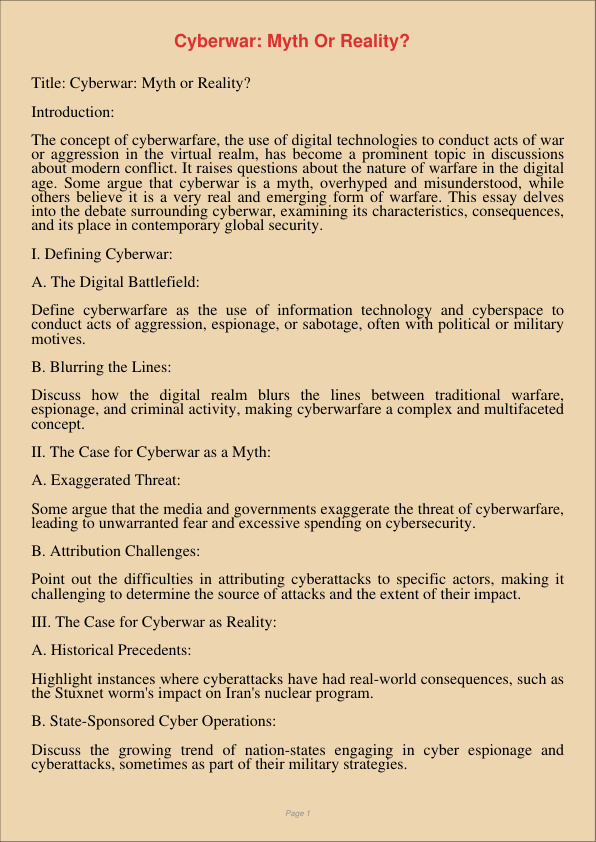
Title: Cyberwar: Myth or Reality?
Introduction:
The concept of cyberwarfare, the use of digital technologies to conduct acts of war or aggression in the virtual realm, has become a prominent topic in discussions about modern conflict. It raises questions about the nature of warfare in the digital age. Some argue that cyberwar is a myth, overhyped and misunderstood, while others believe it is a very real and emerging form of warfare. This essay delves into the debate surrounding cyberwar, examining its characteristics, consequences, and its place in contemporary global security.
I. Defining Cyberwar:
A. The Digital Battlefield:
Define cyberwarfare as the use of information technology and cyberspace to conduct acts of aggression, espionage, or sabotage, often with political or military motives.
B. Blurring the Lines:
Discuss how the digital realm blurs the lines between traditional warfare, espionage, and criminal activity, making cyberwarfare a complex and multifaceted concept.
II. The Case for Cyberwar as a Myth:
A. Exaggerated Threat:
Some argue that the media and governments exaggerate the threat of cyberwarfare, leading to unwarranted fear and excessive spending on cybersecurity.
B. Attribution Challenges:
Point out the difficulties in attributing cyberattacks to specific actors, making it challenging to determine the source of attacks and the extent of their impact.
III. The Case for Cyberwar as Reality:
A. Historical Precedents:
Highlight instances where cyberattacks have had real-world consequences, such as the Stuxnet worm’s impact on Iran’s nuclear program.
B. State-Sponsored Cyber Operations:
Discuss the growing trend of nation-states engaging in cyber espionage and cyberattacks, sometimes as part of their military strategies.
C. Impact on Critical Infrastructure:
Emphasize the potential for cyberattacks to disrupt critical infrastructure, such as power grids, financial systems, and transportation networks.
IV. The Gray Zone:
A. Beyond War and Peace:
Describe the “gray zone,” a concept that acknowledges the space between traditional peace and war where cyber operations often take place.
B. Espionage and Deterrence:
Discuss how cyber activities, such as espionage and the development of cyberweapons, play a role in modern deterrence strategies.
V. Legal and Ethical Considerations:
A. International Law:
Explore the application of international law to cyberwarfare and the challenges in defining norms and regulations in the digital realm.
B. Ethical Dilemmas:
Examine the ethical considerations surrounding cyberwarfare, including questions about proportionality and the potential for collateral damage.
VI. Conclusion:
The debate over whether cyberwar is a myth or reality remains a complex and evolving issue. While there are legitimate concerns about the potential for exaggeration and fear-mongering, there is ample evidence to support the existence of cyberwarfare as a genuine and growing form of conflict. As technology continues to advance and nation-states develop their cyber capabilities, the need for clear international norms and regulations in cyberspace becomes increasingly urgent. In this digital age, understanding the nuances of cyberwarfare is essential for policymakers, security experts, and the general public as we grapple with the evolving nature of global security threats.
「真诚赞赏,手留余香」
真诚赞赏,手留余香
使用微信扫描二维码完成支付
